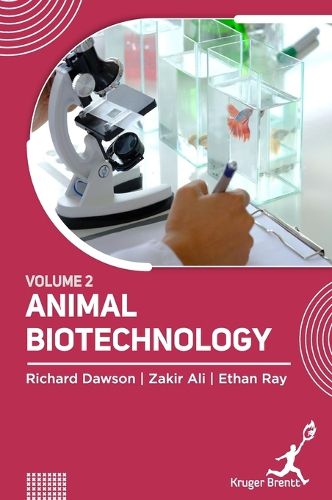Readings Newsletter
Become a Readings Member to make your shopping experience even easier.
Sign in or sign up for free!
You’re not far away from qualifying for FREE standard shipping within Australia
You’ve qualified for FREE standard shipping within Australia
The cart is loading…






This title is printed to order. This book may have been self-published. If so, we cannot guarantee the quality of the content. In the main most books will have gone through the editing process however some may not. We therefore suggest that you be aware of this before ordering this book. If in doubt check either the author or publisher’s details as we are unable to accept any returns unless they are faulty. Please contact us if you have any questions.
1.Introduction to Animal Biotechnology: Provide an overview of the field of animal biotechnology, its importance in agriculture, medicine, and environmental conservation. Discuss how biotechnology is applied to improve animal breeding, health, and productivity.
2.Genetic Engineering in Animals: Explore the techniques used in genetic engineering, such as gene editing (CRISPR-Cas9), transgenesis, and cloning. Discuss the applications of these technologies in creating genetically modified animals for enhanced traits, disease resistance, or production efficiency.
3.Animal Cloning and Reproductive Biotechnology: Examine the methods and ethical considerations surrounding animal cloning, including somatic cell nuclear transfer (SCNT). Discuss advancements in reproductive biotechnology, including artificial insemination, embryo transfer, and cryopreservation.
4.Biotechnology in Animal Health: Discuss the role of biotechnology in improving animal health, including the development of vaccines, diagnostics, and therapeutic interventions. Highlight how biotechnology is used to combat infectious diseases and enhance animal welfare.
5.Applications in Livestock Production: Explore how animal biotechnology is used in livestock breeding to improve productivity, disease resistance, and meat or milk quality. Discuss the genetic selection of animals for desirable traits and the role of biotechnological tools in sustainable farming practices.
6.Ethical, Regulatory, and Environmental Considerations: Address the ethical issues surrounding animal biotechnology, including concerns about animal welfare, environmental impacts, and public acceptance. Discuss regulatory frameworks governing the use of biotechnology in animals and the safety standards for genetically modified animals.
$9.00 standard shipping within Australia
FREE standard shipping within Australia for orders over $100.00
Express & International shipping calculated at checkout
This title is printed to order. This book may have been self-published. If so, we cannot guarantee the quality of the content. In the main most books will have gone through the editing process however some may not. We therefore suggest that you be aware of this before ordering this book. If in doubt check either the author or publisher’s details as we are unable to accept any returns unless they are faulty. Please contact us if you have any questions.
1.Introduction to Animal Biotechnology: Provide an overview of the field of animal biotechnology, its importance in agriculture, medicine, and environmental conservation. Discuss how biotechnology is applied to improve animal breeding, health, and productivity.
2.Genetic Engineering in Animals: Explore the techniques used in genetic engineering, such as gene editing (CRISPR-Cas9), transgenesis, and cloning. Discuss the applications of these technologies in creating genetically modified animals for enhanced traits, disease resistance, or production efficiency.
3.Animal Cloning and Reproductive Biotechnology: Examine the methods and ethical considerations surrounding animal cloning, including somatic cell nuclear transfer (SCNT). Discuss advancements in reproductive biotechnology, including artificial insemination, embryo transfer, and cryopreservation.
4.Biotechnology in Animal Health: Discuss the role of biotechnology in improving animal health, including the development of vaccines, diagnostics, and therapeutic interventions. Highlight how biotechnology is used to combat infectious diseases and enhance animal welfare.
5.Applications in Livestock Production: Explore how animal biotechnology is used in livestock breeding to improve productivity, disease resistance, and meat or milk quality. Discuss the genetic selection of animals for desirable traits and the role of biotechnological tools in sustainable farming practices.
6.Ethical, Regulatory, and Environmental Considerations: Address the ethical issues surrounding animal biotechnology, including concerns about animal welfare, environmental impacts, and public acceptance. Discuss regulatory frameworks governing the use of biotechnology in animals and the safety standards for genetically modified animals.